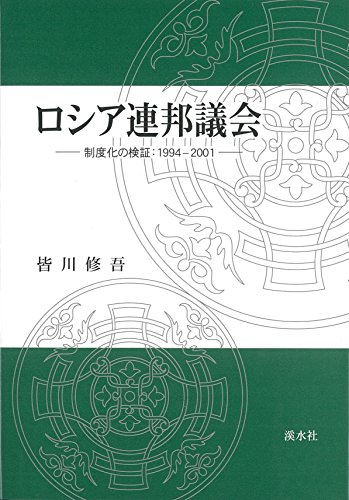1 0 0 0 OA グローバル化のなかの北方領土問題 : レジーム構築試案
- 著者
- 皆川 修吾
- 出版者
- 愛知淑徳大学
- 雑誌
- 愛知淑徳大学論集. グローバルカルチャー・コミュニケーション研究科篇 (ISSN:18837573)
- 巻号頁・発行日
- no.2, pp.65-81, 2010-03-06
1 0 0 0 OA ソ連官僚制の一行動様式
- 著者
- 皆川 修吾
- 出版者
- THE JAPANESE ASSOCIATION FOR RUSSIAN AND EAST EUROPEAN STUDIES
- 雑誌
- ソ連・東欧学会年報 (ISSN:03867226)
- 巻号頁・発行日
- vol.1981, no.10, pp.2-13, 1981 (Released:2010-03-16)
- 参考文献数
- 23
- 被引用文献数
- 1 1
1 0 0 0 ロシア連邦議会 : 制度化の検証: 1994-2001
1 0 0 0 OA ロシア人脈政治の新展開 -制度化過程におけるリーダーシップと人脈政治の位置付け-
- 著者
- 皆川 修吾
- 出版者
- JAPAN ASSOCIATION OF INTERNATIONAL RELATIONS
- 雑誌
- 国際政治 (ISSN:04542215)
- 巻号頁・発行日
- vol.1993, no.104, pp.35-49,L7, 1993-10-10 (Released:2010-09-01)
- 参考文献数
- 21
This paper attempts to find out how the clientelist groups work and what part they play in the process of political institutionalization. First, the paradigm of institutionalization process is tentatively presented in the paper. The paper then locates the political culture in the process of institutionalization. Clientelist behaviour which has been said to be a part of political culture was a key to understanding Soviet politics. Therefore, clientelism associated with Gorbachev's and Yeltsin's leadership was comparatively examined. In conclusion, whether the clientelism is functional or dysfunctional to the political system of transitional period was discussed.A patron-client relationship is an alliance between two persons of unequal status, power or resources, each of whom finds it useful to have as an ally someone superior or inferior to himself.Under the Soviet regime, clientelist operations were accommodated, if not ideologically, by peculiar institutional set-ups. It was indeed an important aspect of systemic adjusting mechanism in Soviet policy processes.Power politics among contending clientelist groups are in appearance more marked during the transitional period than during Soviet period. That may be so. The paper proves that clientelist politics which are by nature dependable variables, require solid institutional back-ups. Without it, the clientelist groups cannot assert themselves as self-perpetuating elites. It is the latter who can exert a decisive influence upon the course of the Russian political system. One has to admit, however, that the emergence of such an elite cannot be expected unless these groups can pride themselves on the destiny of their own country.

